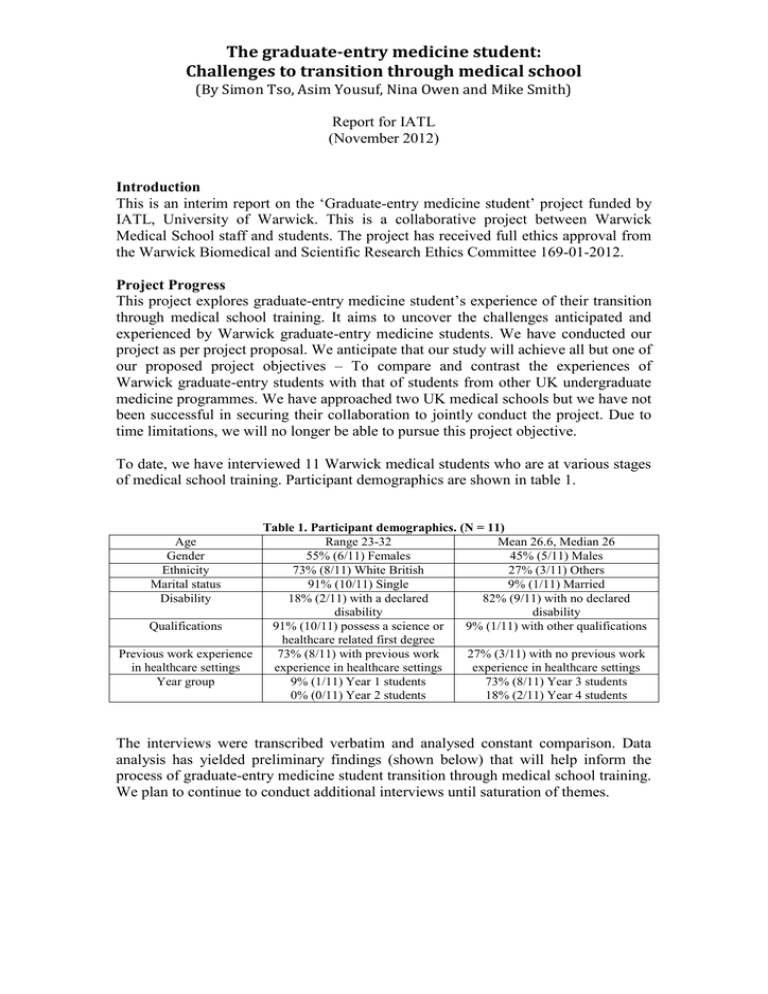The graduate-entry medicine student: Challenges to transition through medical school
advertisement

The graduate-entry medicine student: Challenges to transition through medical school (By Simon Tso, Asim Yousuf, Nina Owen and Mike Smith) Report for IATL (November 2012) Introduction This is an interim report on the ‘Graduate-entry medicine student’ project funded by IATL, University of Warwick. This is a collaborative project between Warwick Medical School staff and students. The project has received full ethics approval from the Warwick Biomedical and Scientific Research Ethics Committee 169-01-2012. Project Progress This project explores graduate-entry medicine student’s experience of their transition through medical school training. It aims to uncover the challenges anticipated and experienced by Warwick graduate-entry medicine students. We have conducted our project as per project proposal. We anticipate that our study will achieve all but one of our proposed project objectives – To compare and contrast the experiences of Warwick graduate-entry students with that of students from other UK undergraduate medicine programmes. We have approached two UK medical schools but we have not been successful in securing their collaboration to jointly conduct the project. Due to time limitations, we will no longer be able to pursue this project objective. To date, we have interviewed 11 Warwick medical students who are at various stages of medical school training. Participant demographics are shown in table 1. Table 1. Participant demographics. (N = 11) Range 23-32 Mean 26.6, Median 26 55% (6/11) Females 45% (5/11) Males 73% (8/11) White British 27% (3/11) Others 91% (10/11) Single 9% (1/11) Married 18% (2/11) with a declared 82% (9/11) with no declared disability disability Qualifications 91% (10/11) possess a science or 9% (1/11) with other qualifications healthcare related first degree Previous work experience 73% (8/11) with previous work 27% (3/11) with no previous work in healthcare settings experience in healthcare settings experience in healthcare settings Year group 9% (1/11) Year 1 students 73% (8/11) Year 3 students 0% (0/11) Year 2 students 18% (2/11) Year 4 students Age Gender Ethnicity Marital status Disability The interviews were transcribed verbatim and analysed constant comparison. Data analysis has yielded preliminary findings (shown below) that will help inform the process of graduate-entry medicine student transition through medical school training. We plan to continue to conduct additional interviews until saturation of themes. The graduate-entry medicine student: Challenges to transition through medical school (By Simon Tso, Asim Yousuf, Nina Owen and Mike Smith) Preliminary Results Theme: Student’s perspective of the challenges of medical school training Sub-theme: Anticipated challenge Sub-theme: Challenges experienced Sub-theme: The impact of prior experience on student’s experiences and expectations of medical school training Sub-theme: The experience of students with disabilities Theme: The process of establishing professional identity Sub-theme: Becoming part of a community of practice (Lave & Wenger 1991). Sub-theme: How ‘social influence’ shapes the learning experiences of medical students Discussion This project has yielded preliminary results that will enrich our understanding of the experience of Warwick graduate-entry medicine students and the process of their transition through medical school training. Once the project is completed, we anticipate the project findings can be used to help improve student experiences. Acknowledgement We would like to thank the IATL for the prestigious grant that enabled us to conduct this project. Reference Lave J, Etienne W. 1991. Situated learning: Legitimate peripheral participation. Cambridge: Cambridge University Press.



